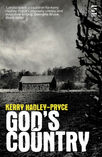Notes on an Unfinished Novel
- Kerry Hadley
- Nov 20, 2017
- 4 min read
I've been to Manchester on a work weekend. I say this because (a) I've done no writing over the weekend, and (b) since I travelled by train, it gave me some time to read. And I'm re-eading John Fowles' essay Notes on an Unfinished Novel (1969) in The Novel Today, (ed. Malcolm Bradbury, 1977). This is an essay written in tandem with the writing of The French Lieutenant's Woman, and in which Fowles expresses some of the frustrations and pleasures, doubts and thoughts (general and specific) of and when writing a novel 'in real time'. (This was, incidentally, the original inspiration for me keeping this blog. His were undated diary extracts.) In it, Fowles mentions how he saw the haunting image of a woman of a woman staring out to sea from a deserted quay, and of how the image wouldn't leave him alone, despite him trying to ignore it. There are a number of interesting observations he makes, for example: 'Narcissism or pygmalionism, is the essential vice a writer must have. Characters (and even situations) are like children or lovers, they need constant caressing, concern, listening to, watching, admiring. All these occupations become tiring for the active partner - the writer - and only something akin to love can provide the energy.' (p137) I think, perhaps, this is why, often, writers choose to write 'likeable' characters, so that they can nurture them, so that they feel responsible for the goodness in them. This doesn't explain why my characters are far from likeable, in the main. If we're talking about images that haunt me, there is this image of a wandering female, invulnerable in her transience. A female walker, a flaneuse. She disrupts, willingly it seems, the flow of things in this narrative. She's a curious, not exactly unpleasant character, but slightly out of the loop. Like Fowles and his woman on the quay, I realise I think about her, the way she moves and might speak. On Saturday, though, I slept, uncharacteristically, for five hours straight (I normally peak at about three) and I'm convinced this was because I knew I wouldn't have much time to write what with having to get up and work again on Sunday. I could, if you like, put her out of my mind. But last night (Sunday) back at home, she was waiting for me. Here's a break-down of my sleep, according to Withings: it says just over two hours of deep sleep, and a couple of hours of snoozing, and 'awake three times'. I'm blaming her.
Fowles says, 'I woke in the small hours, and the book tormented me. All its failings rose up in the darkness.' (p146) He mentions how his female characters 'tend to dominate the male.' He says, 'I see man as a kind of artifice, and woman as a kind of reality.' (p146) I think this is an idea I'm tussling with in my novel, and this idea of about men and women/artificiality and reality, essentially, is a psychogeographic idea. This meld of fact with fiction, I'm talking about. Fowles' quote made me think about how I ought to consider my descriptions of the Black Country landscape in my novel. Should it be with an eye on the artifice of the landscape as male, and my female character as 'reality' or vice versa? Perhaps my female character is the artifice within the 'real' setting. I need to think about this. I'm also thinking about structure and narrative voice, and of the way of making what Loffler refers to in Walking in the City, Urban Experience and Literary Psychogeograhy in 18th Century London, 2017, p58), ‘The writer or narrator respectively structures reality according to a “wandering viewpoint”, but importantly he or she is not merely a neutral recorder…but a participant whose individual experience shapes the writing in an almost romantic fusion of subjectivity and objectivity.’ (Berensmeyer & Loffler, [forthcoming] in Loffler, p96) and the sense that ‘it can be something of an obstacle race for the reader whose journey through the narrative is anything but smooth and pleasant.’ (Berensmeyer & Loffler, [forthcoming] p120). She quotes Coverley, ‘as the reader is conducted on a journey with the author as a guide.’ (Coverley, p42 cited Loffler, p56). My current reading-for-pleasure is Michel Faber's The Crimson Petal and the White, 2002, Canongate, Edinburgh in which there is a skilful swaying from one character's narration through an unbeaten path into another's.There's nothing confusing about the way in which Faber does this, and whilst I am aware I am looking for elements of what might be meant by psychogeography in writing, I am certain this cinematic re-spotlighting of narrative perspective is an important feature. As such, in my job as the writer (or, as Loffler might put it the 'guide') of this novel, I can see that there will be an element of 'Flow', or intuition, as to how that is done, both as a real-time process, and an analysis after the fact.









Comments